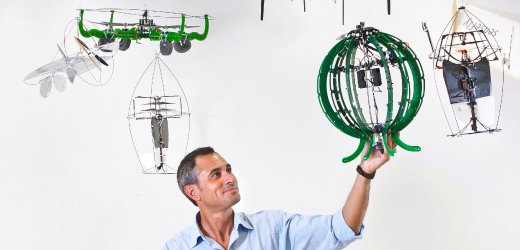
Evo* is the umbrella conference of a number of sub-conferences featuring the latest theoretical and applied research in the field of evolutionary computation. Evolutionary computation is a fascinating subfield of artificial intelligence which takes inspiration from nature and the theory of Darwinian evolution to produce highly optimized processes and networks. It is often applied in computer science, but at Evo* it is applied to areas as diverse as music and art to risk management. This made for an eye-opening few days.
The conference began with an exciting plenary talk by Prof Dario Floreano (pictured below), in which he wowed everyone with his development of flying robots which can autonomously regulate altitude, steering, and landing using only perceptual cues. His vision to allow robots to ‘live in the 3rd dimension’ also featured robots which are programmed to behave altruistically. One wonders how far we may be from robots as sophisticated as ‘the Terminator’ (I refer here to the friendly one).
The EvoBIO track, which was sponsored by the BioMed Central journal BioData Mining features research which applies methods of evolutionary computation to machine learning and data mining. This year’s research ranged from the utilization of an artificial bee colony algorithm to improve the inference of phylogenetic trees, to Genetic Programming applied to Lévy flights (a class of random walks inspired by observing animal foraging habits). Another paper presented by Bill Langdon examined what appears to be unintentional infection of the human genome in laboratories, the contaminated samples of which have been unwittingly deposited in GenBank.
flights (a class of random walks inspired by observing animal foraging habits). Another paper presented by Bill Langdon examined what appears to be unintentional infection of the human genome in laboratories, the contaminated samples of which have been unwittingly deposited in GenBank.
As part of an ongoing arrangement with EvoBIO, BioData Mining offers free publication each year to the winner of the best paper award and a discounted Article Processing Charge to all runners up. This year’s winner was Lars Rosenbaum, whose research examines particle swarm optimization applied to ligand-based virtual screening experiments. Particle swarm optimization (PSO) is a computational method that optimizes a problem by iteratively attempting to enhance a candidate solution relating to a given measure of quality.
But it wasn’t just all about data mining and Darwinian evolution; a lot of thought was put into the evening events, where we were treated to Spanish tapas and flamenco dancing at a medieval castle. The panoramic views from the castle allowed delegates to contemplate the meaning of life and perhaps the nature itself that provides such meaningful inspiration to this area of research. I found the research presented at this conference not only valuable to science, but quite remarkable.
We look forward to the next Evo* conference, which takes place in Vienna. Hasta la vista until next year!
Comments